Creation Care
Climate defenders should celebrate the news that Obama is continuing to delay signing a permit that would allow foreign-owned mining company TransCanada a permit to build the northern route of the highly controversial Keystone XL pipeline across the U.S.
After the State Department once again released a highly flawed assessment in March and the Environmental Protection Agency called it “deeply flawed” (again), we see that grassroots pressure is creating an effective roadblock on this incredibly dangerous path.
From Reuters:
The Obama administration is unlikely to make a decision on the Canada-to-Nebraska Keystone XL pipeline until late this year as it painstakingly weighs the project’s impact on the environment and on energy security, a U.S. official and analysts said on Friday.
The decision may not be made until November, December or even early 2014, said a U.S. official … who did not want to be named given the sensitive nature of the project.
Analysts agreed that a decision would not be made by this summer as the State Department had suggested when it issued an environmental review on the pipeline on March 1.
A recent study by biologists and climate researchers finds 57% of plants and 34% of animals will see their habitats cut by 50% or more by 2080. At the current rate worldwide temperatures are expected to rise 7 degrees by 2100. This change will make habitats in sub-Saharan Africa, Central America, Amazonia and Australia unsuitable for animals and plants. USA Today reports:
"The terrifying loss of biodiversity predicted by this study shows that climate chaos will fundamentally transform our planet," Shaye Wolf of the Center for Biological Diversity, a conservation group, says in a statement on the study. "We need to cut emissions now, before our ecosystems suffer catastrophic damage."
Read more here.
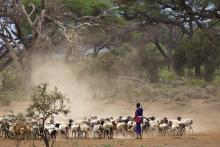
We have come to Kenya to hear our brothers and sisters bear witness to the ways environmental degradation and recent changes in the climate are harming them. Their testimony is disturbing and compelling. We are privileged to hear their stories, and honored by their trust in us as bearers of the message that they and their land, water, and air are suffering. Their words are a painful reminder of the brokenness of our world.
It is the most vulnerable in our world who suffer primarily and predominately from climate and other environment-related problems. While here, we are reminded that it is the poor who are affected first of all, and most of all, by these problems. The loss of one season’s crop can be catastrophic for those who live on the margins. Today, we are looking at massive dislocations in the ecosystems which sustain our world and all the life on it. Of these dislocations, the world’s poorest bear the brunt.
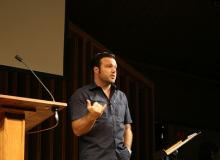
One of us was in Seattle this past weekend to speak at a meeting of biblical scholars. The subject:Evangelicals and the Environment. Seattle was stunningly beautiful, with ample sunshine, clear skies, and an occasional happy breeze. Having grown up in nearby Tacoma, seeing majestic Mount Rainier for the first time in a long while brought back memories of this silent guardian from childhood.
Alas, while it was sunny in Seattle, it was theologically cloudy in Dallas, where one of Seattle's famous residents — young, hip pastor, Mark Driscoll — was speaking at a major evangelical conference: Catalyst. By many accounts on Twitter and in the blogosphere (see Nate Pyle's blog), Driscoll said:
"I know who made the environment. He's coming back and he's going to burn it all up. So yes, I drive an SUV."
And after presenting his driving credentials, Rev. Driscoll reportedly added:
"If you drive a mini-van, you're a mini-man."
The U.S. climate change envoy proposed allowing countries to create their emissions reduction plans rather than working toward one goal. The U.S. hopes to bring more countries to the table and energize U.N. climate negotiations. The Guardian reports:
"Countries, knowing that they will be subject to the scrutiny of everybody else, will be urged to put something down they feel they can defend and that they feel is strong," Stern said from Berlin during a summit of environmental ministers focused on ways to advance the UN climate talks.
Read more here.
A study published May 1 from two researchers at the University of Pittsburgh and the University of Colorado found the widespread belief in "end-times" and the "Second coming" of Christ could impact the environmental policy movement negatively. The Huffington Post reports:
A belief in the Second Coming reduces the probability of strongly agreeing that the government should take action by more than 12 percent. In a corresponding manner, a belief in the Second Coming increases the probability of disagreeing with government action to curb global warming by more than 10 percent.
Read more here.
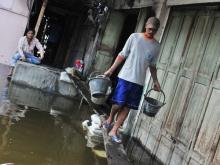
If you are reading this and are from North America — and perhaps even if you aren't — you are no doubt aware of just how divisive the issue of climate change is in the US and Canada. Experts from both sides of the issue are regular installments on the 24-hour news networks, presenting the latest data in favor of or disputing the warming of the planet. Policy experts offer the pros and cons of legislation aimed at cutting greenhouse gas emissions. Law makers debate possible action steps. Facebook posts supporting or refuting climate change turn into hotbeds of political (and sometimes a little bit of personal) attacks. Friends bicker; family relationships are strained.
This is simply the reality of the political climate in North America, but the existence of such rigorous debate is no coincidence. If warming trends continue the way that scientists are currently projecting (four degrees celsius by the end of the century), things in North America won't look all that different. We'll probably experience more droughts, our growing zones will shift, and Michigan will have the climate of Tennessee. Even if things do get bad in North America, we have the money and technology necessary to adapt fairly well to any changes in weather patterns or growing seasons that we might experience. In short: North America can afford not to worry about climate change — at least for a while.
A NASA led study found climate change may increase rainfall in some areas and drought in other areas. The study predicts for every 1 degree Fahrenheit increase in global average temperature, heavy rainfall will increase globally by 3.9%. The Los Angeles Times reports.
"These results in many ways are the worst of all possible worlds," said Peter Gleick, a climatologist and water expert who is president of the Pacific Institute, an Oakland research organization. "Wet areas will get wetter and dry areas will get drier."
Read more here.

While relaxing on a friend’s back porch over a spicy vegetarian stew and homemade bread, the conversation turned, naturally, to food. Everyone around the table expressed concern over how much junk food kids eat and how little time children spend outdoors. Our host said that she watches every afternoon as a group of elementary schoolchildren head to the corner market to purchase their after-school snack. Each child comes out with a supersized soda and a bag of potato chips. Not a small bag — the family size, for each child, every day.
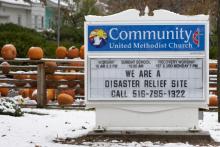
This week marked six months since Superstorm Sandy left entire communities devastated, families homeless, and many with little hope. But in the midst of this natural disaster, many banded together. As is true with many of our nation's tragedies, recent and throughout our history, communities form and hope emerges amid struggle. Sandy taught us about resilience. It showed us what it truly means to reach out, serve, and love our neighbor.
One young filmmaker in New York, Farihah Zaman, caught that resilience and acts of service on video. Here, she shows us how tragedy can turn into a joint effort to acheive the common good.
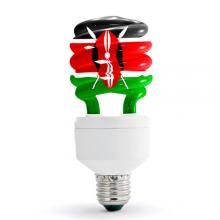
Is there anything more important to us than the air we take into our lungs every few seconds? The water that keeps us and all living things going? The soil that roots our food and our communities? Or the weather patterns that knit these elements all together?
What happens when these things begin to deteriorate — or rapidly change their behavior?
That is why I’m in Kenya with Cal DeWitt — well known Christian environmental scientist and teacher — and a group of eight others from the US and Canada: scientists, teachers, activists, and a film-maker.
The expansion of hydrofracking could strain water resources from Forth Worth to western Colorado. The New York Times reports:
“Given projected sharp increases” in the production of oil and gas by the technique commonly known as fracking, the report from the group Ceres said, “and the intense nature of local water demands, competition and conflicts over water should be a growing concern for companies, policy makers and investors.”
One option is to recycle the water used in hyrdofracking. However the water may contain chemicals, natural pollutants, or ever radioactivity and it is expensive to clean the water. Some companies are expanding their use of brackish, undrinkable water unstead of fresh water to lessen their environmental impact.
Read more here.
General Motors signed the Climate Declaration. The statement is part of a new initiative by businesses for greater action on global warming in Washignton. No specific recommendations are made in the declaration. The Guardian reports:
"We want to be a change agent in the auto industry," Mike Robinson, GM vice-president of sustainability and global regulatory affairs, said in a statement.
Other endorsers of the Climate Declaration include eBay, Ceres, Starbucks, and Unilever.
The short statement, endorsed by GM, leads off: "Tacking climate change is America's greatest economic opportunity of the 21st century (and it's simply the right thing to do)."
Read more here.
The ratio of carbon dioxide in Earth’s atmosphere is approaching with 400 parts per million. This amount of carbon dioxide in the atmosphere has not been seen since about 2.5 million to 5 million year ago. Scientists are alarmed that CO2 levels are also rising in places far from pollution sources. The Los Angeles Times reports:
"The 400-ppm threshold is a sobering milestone, and should serve as a wake-up call for all of us to support clean-energy technology and reduce emissions of greenhouse gases, before it's too late for our children and grandchildren," said Tim Lueker, an oceanographer and carbon cycle researcher who is a longtime member of the Scripps CO2 Group.
Read more here.

In the secular American political world, even among progressives, two progressive focuses – social justice and healing of the Earth – have remained mostly segregated from each other.
But the Bible, in one of its crucial passages, intertwine social justice and the urge toward healing Earth. It is as if the Bible – after watching the alienation of two May Days (pagan spring and workers’ social justice) from each other – had shrugged impatiently and said: “Now here’s the way to do it!”
The Bible calls for an entire year of rest for the land and its workers, every seventh year. Deuteronomy adds that in that year, everyone’s debts are annulled. (Deut. 15: 1-3). Thus the Bible sees economics and ecologics as intimately intertwined, and calls for a practice of strong, spiritually rooted regulation of both.
Leviticus calls this seventh year a Shabbat Shabbaton – restfulness to the exponential power of Restfulness, an echo and expansion of the restful seventh day. Deuteronomy calls the year “shmitah” – “release” or “non-attachment.”
Why all this? Because, says YHWH, YyyyHhhhWwwwHhhh, The Interbreathing of all life, “The earth is Mine. You are but sojourners, temporary visiting-settlers, with Me.” (Lev 25: 23)
The sea-surface temperatures were the highest measured in 150 years in 2012. USA Today reports:
"The average temperature in that area hit a record high of 57.2 degrees last year. The previous record was set in 1951, according to NOAA."
The rise in temperature could influence fish and shellfish on the Northeast shell.
Read more here.

A pipeline that will run from Canada, through the Midwest, and down to the Gulf Coast, the purpose of Keystone is to transport tar sands oil, which is more toxic than conventional oil, to ports where it can be processed and shipped overseas. In fact, the only oil that is guaranteed to stay in the U.S. is what will be spilled in communities and on farmlands. We saw this happen recently when a similar pipeline spilled in Arkansas. And, as for the promise of jobs, independent studies say fewer than 50 permanent jobs will be created by this project. Keystone is a deal in which America gets all the risk without any reward.
It's time for our leaders to take a stand and to stop supporting projects that only perpetuate our dependence on toxic, dirty sources of energy that contribute to climate change. But in the world of politics, it's not enough for something to be a moral imperative to get people to act. It is the nature of politics, and democracy, that our leaders respond when they feel the political pressure to do so. As people of faith, we have a powerful voice in our country. Keystone would not have been an issue in the Massachusetts Senate race if local religious communities had not made it clear that it is important.

Stories are what change the world, more than just ideas. And that’s what I am seeing and hearing on the road — stories that will change people for the common good. Nobody outside of Washington trusts Washington because there are no more human stories — just money and the calculations of power.
But even Washington can be affected by the stories outside of Washington — take immigration reform for example, which will happen despite the political paralysis. People of faith are telling their stories of conversion to what their Bibles say about “the stranger.” They are telling stories of new relationships with their “undocumented” brothers and sisters. And their stories are changing Washington.
So rather than just offer you more “ideas” about the common good, we are going to offer you some stories about how ordinary people are creating it.
Some talented young filmmakers have created stories to inspire you. This first video tells in beautiful scenes, the story of how a group in the Dominican Republic is using a recycling program to fund senior services. It’s about community and about serving our neighbors. It is a real inspiration for working within our own spheres of influence for the good of all.
Watch. Listen. And then create your own story for the common good.

Have you ever heard someone described as, “So heavenly minded, he was no earthly good?” This phrase suggests one danger of interpreting the book of Revelation. Sadly, when it comes to considering the natural world and Revelation, heavenly mindedness often undermines care for our environment. Some Christians have a tendency to think, “Well, if I’m off to heaven, I shouldn’t care much about this silly earth of ours. It’s just a temporary home, after all.”
In fact, Revelation suggests the opposite: the earth isn’t truly “left behind,” but renewed, becoming the very dwelling place of God. Revelation 21 calls people to be, well, “earthly good,” caring for creation as we prepare for God to come home.
